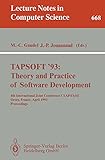TAPSOFT'93: Theory and Practice of Software Development [electronic resource] : 4th International Joint Conference CAAP/FASE Orsay, France, April 13–17, 1993 Proceedings / edited by M. -C. Gaudel, J. -P. Jouannaud.
Material type: TextSeries: Lecture Notes in Computer Science ; 668Publisher: Berlin, Heidelberg : Springer Berlin Heidelberg, 1993Description: XII, 768 p. online resourceContent type: text Media type: computer Carrier type: online resourceISBN: 9783540475989Subject(s): Computer science | Software engineering | Computer software | Logic design | Computer Science | Programming Techniques | Software Engineering | Programming Languages, Compilers, Interpreters | Computation by Abstract Devices | Algorithm Analysis and Problem Complexity | Logics and Meanings of ProgramsAdditional physical formats: Printed edition:: No titleDDC classification: 005.11 LOC classification: QA76.6-76.66Online resources: Click here to access online
TextSeries: Lecture Notes in Computer Science ; 668Publisher: Berlin, Heidelberg : Springer Berlin Heidelberg, 1993Description: XII, 768 p. online resourceContent type: text Media type: computer Carrier type: online resourceISBN: 9783540475989Subject(s): Computer science | Software engineering | Computer software | Logic design | Computer Science | Programming Techniques | Software Engineering | Programming Languages, Compilers, Interpreters | Computation by Abstract Devices | Algorithm Analysis and Problem Complexity | Logics and Meanings of ProgramsAdditional physical formats: Printed edition:: No titleDDC classification: 005.11 LOC classification: QA76.6-76.66Online resources: Click here to access online  E-BOOKS
E-BOOKS
| Current library | Home library | Call number | Materials specified | URL | Status | Date due | Barcode |
|---|---|---|---|---|---|---|---|
| IMSc Library | IMSc Library | Link to resource | Available | EBK6122 |
Goldilocks and the three specifications -- On relating some models for concurrency -- Compositionality results for different types of parameterization and parameter passing in specification languages -- Proving ground confluence and inductive validity in constructor based equational specifications -- Associative-commutative discrimination nets -- Algebraic specification and development in geometric modeling -- A case study in transformational design of concurrent systems -- Yeast: A case study for a practical use of formal methods -- Verification and comparison of transition systems -- Constraining interference in an object-based design method -- From ?-calculus to higher-order ?-calculus — and back -- Hyperedge replacement with rendezvous -- True concurrency semantics for a linear logic programming language with broadcast communication -- A general framework for modular implementations of modular system specifications -- Specifications can make programs run faster -- Application of the composition principle to unity-like specifications -- Trees, ordinals and termination -- When is a functional tree transduction deterministic? -- Automata on infinite trees with counting constraints -- Directed column-convex polyominoes by recurrence relations -- Object organisation in software environments for formal methods -- Monads, indexes and transformations -- A technique for specifying and refining TCSP processes by using guards and liveness conditions -- Applications of type theory -- Feature automata and recognizable sets of feature trees -- About the theory of tree embedding -- Linear unification of higher-order patterns -- A theory of requirements capture and its applications -- Exception handling and term labelling -- Gate splitting in LOTOS specifications using abstract interpretation -- Constructing systems as object communities -- Term rewriting in CT? -- Optimal reductions in interaction systems -- Optimal solutions to pattern matching problems -- Testing for a conformance relation based on acceptance -- Testability of a communicating system through an environment -- Automating (specification = implementation) using equational reasoning and LOTOS -- On the Ehrenfeucht-Fraïssé game in theoretical computer science -- On asymptotic probabilities in logics that capture DSPACE(log n) in presence of ordering -- A propositional dense time logic -- La Vraie Forme d'un Arbre -- Model checking using net unfoldings -- Reachability analysis on distributed executions -- Property preserving abstractions under parallel composition -- Types as parameters -- Polymorphic type inference with overloading and subtyping -- Type reconstruction with recursive types and atomic subtyping -- (Un)expected path lengths of asymmetric binary search trees -- Trie size in a dynamic list structure -- A fully parallel calculus of synchronizing processes -- Generic systolic arrays: A methodology for systolic design.
This volume contains the proceedings of the fourth International Joint Conference on the Theory and Practice of Software Development, TAPSOFT '93. Since the first in 1985, the aim of these conferences has been to bring together theoretical computer scientists and researchers in software engineering with a view to discussing how formal methods can usefully be applied in software development. TAPSOFT '93 consists ofthree parts: an advanced seminar, the Colloquium on Trees in Algebra and Programming (CAAP), and the Colloquium on Formal Approaches of Software Engineering (FASE). The advanced seminar includes four invited surveys and four invited conferences. The selected papers for CAAP are organized in seven sessions: specifications and proofs, concurrency, automata and counting, constraints solving, rewriting, logic and trees, analysis of algorithms, and a common session with FASE on type inference. The selected papers for FASE are presented in eight sessions: case studies in formal design and development, compositionality modules and development, formal development, foundations and analysis of formal specifications, verification of concurrent systems, model checking, parallel calculus, and a common session with CAAP on type inference.


There are no comments on this title.